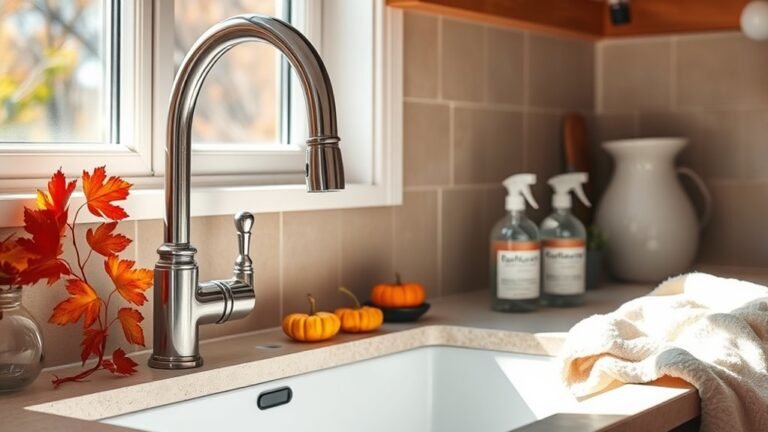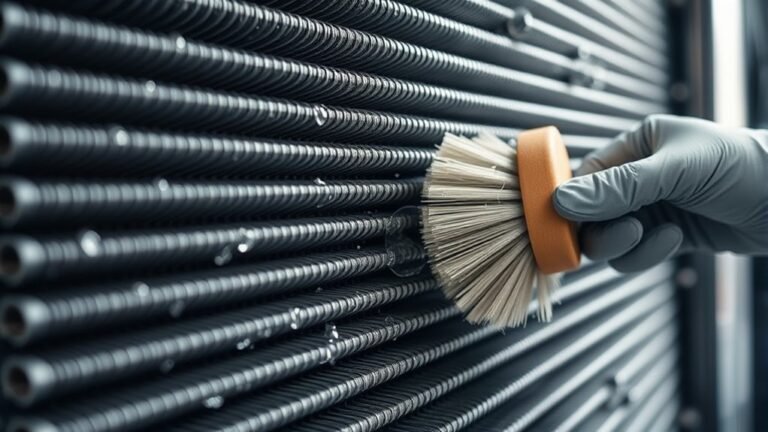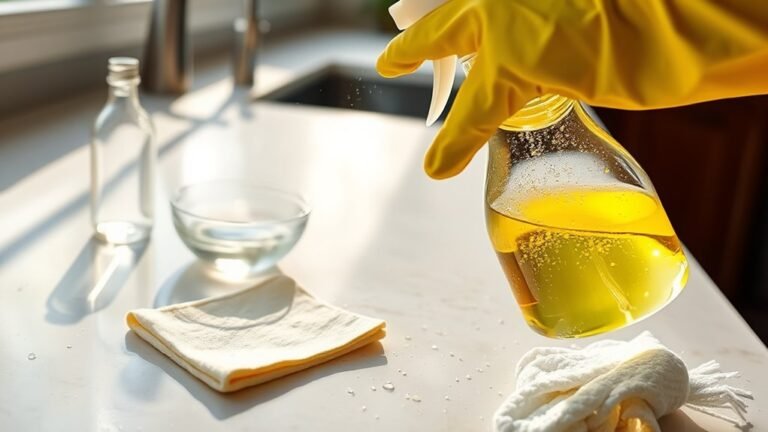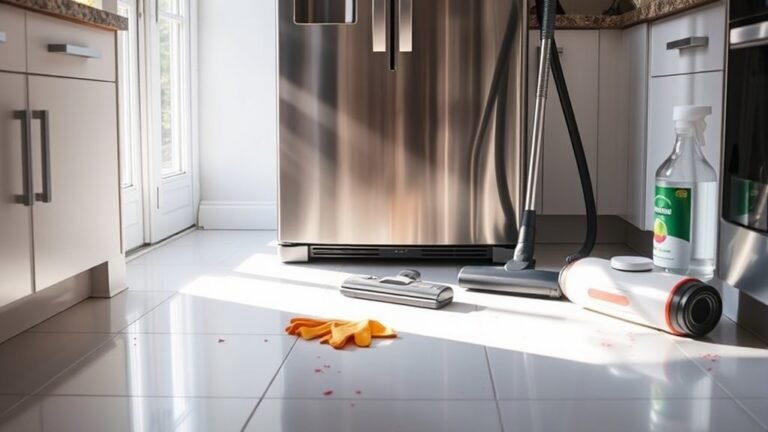How to Clean Your Refrigerator Safely
To clean your refrigerator safely, start by gathering gentle cleaning supplies like microfiber cloths, mild soap, and warm water. Empty the fridge, tossing expired or spoiled items, then carefully remove shelves and drawers to soak and scrub them with warm, soapy water. Wipe down the interior with a damp cloth, focusing on corners and seals, and dry thoroughly to prevent mold. Staying organized and addressing spills promptly helps keep your fridge fresh. If you want to maintain a spotless fridge effortlessly, there’s more to know.
Gather the Necessary Cleaning Supplies
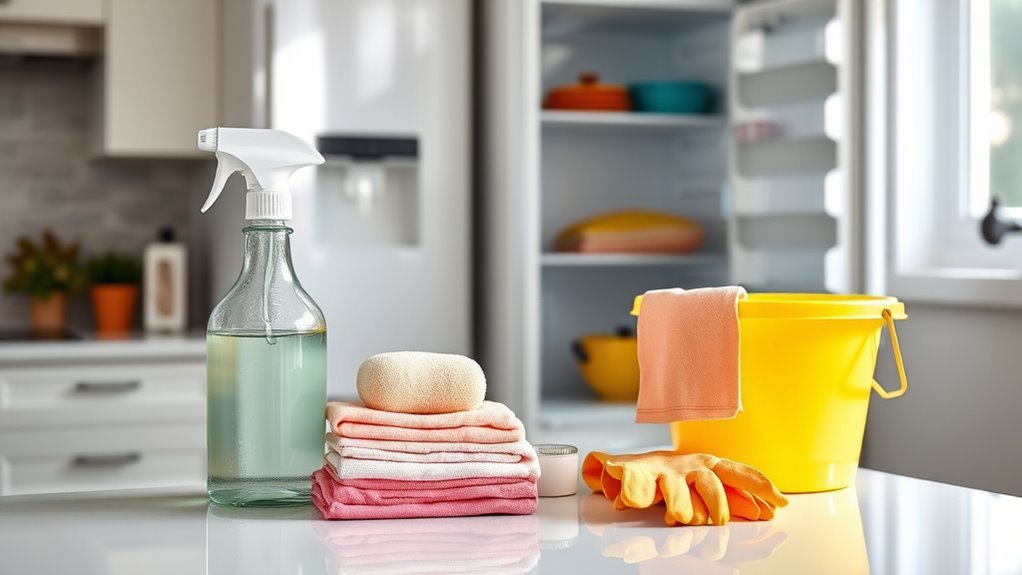
Before you start cleaning your refrigerator, make sure you have all the necessary supplies on hand. You’ll want basic cleaning tools like microfiber cloths, a soft sponge, and a spray bottle filled with a gentle, non-toxic cleaner. Avoid harsh chemicals that could leave harmful residues or damage your fridge’s surfaces. Gloves are essential for your safety—protect your hands from bacteria and cleaning agents. Also, have a small bowl of warm water mixed with baking soda ready; it’s perfect for tackling stubborn stains without compromising safety precautions. Gathering these supplies beforehand means you won’t be interrupted, letting you clean efficiently and confidently. Taking these steps empowers you to maintain your fridge’s cleanliness while honoring your desire for freedom from harmful chemicals and unnecessary hassle.
Empty and Organize Your Refrigerator
Clearing out your refrigerator is the essential first step in a thorough cleaning. Start by removing all items, checking expiration dates, and tossing anything spoiled or unwanted. This gives you space to rethink your approach to refrigerator organization and food storage. Group similar items together—dairy, condiments, leftovers—to make finding and putting away food faster and less stressful. Leaving plenty of room between items improves airflow, keeping everything fresher longer. Consider using clear containers or labels to streamline your system and avoid clutter. By taking control this way, you’re not just cleaning—you’re creating a fridge environment that supports your freedom to grab what you need quickly and get on with your day. A well-organized fridge makes life simpler and food safer.
Remove and Clean Shelves and Drawers

Once you’ve emptied your fridge, it’s time to remove the shelves and drawers for a deep clean. Different shelf types—glass, wire, or plastic—require gentle handling to avoid cracks or bends. Similarly, drawer materials like clear plastic or tempered glass need specific care. Take them out carefully to avoid damage and freedom from sticky messes.
| Shelf Types | Drawer Materials | Cleaning Tips |
|---|---|---|
| Glass | Clear Plastic | Use mild soap, warm water |
| Wire | Tempered Glass | Avoid abrasive scrubbers |
| Plastic | Acrylic | Rinse thoroughly |
Soak shelves and drawers in warm, soapy water, then scrub softly. This approach guarantees you keep your fridge parts spotless and intact, giving you the freedom to enjoy a fresh, clean fridge environment.
Wipe Down Interior Surfaces Safely
After you’ve removed and cleaned the shelves and drawers, it’s time to focus on wiping down the interior surfaces of your refrigerator. To keep things safe and effective, avoid harsh chemicals and opt for gentle solutions instead. Here’s how you can tackle it:
- Use a mixture of warm water and mild dish soap for safe cleaning.
- Dampen a soft cloth or sponge—never soak it—to prevent excess moisture inside.
- Pay special attention to corners and seals where spills often hide.
- Rinse with a cloth wiped in clean water, then dry thoroughly to stop mold growth.
Prevent Future Messes and Maintain Cleanliness

Though cleaning your refrigerator thoroughly is important, preventing future messes can save you time and effort in the long run. To keep things tidy, start by adopting preventive measures like regularly checking expiration dates and wiping spills immediately. Using smart storage solutions, such as clear containers and labeled bins, helps you organize food efficiently and avoid clutter. Keep raw and cooked foods separately to prevent cross-contamination, and store liquids in sealed containers to stop leaks. Establish a routine to quickly scan and declutter your fridge weekly, so nothing gets forgotten and spoils. These habits give you freedom from constant deep cleans while maintaining a fresh, orderly fridge. Taking control now means you’ll enjoy a cleaner, hassle-free kitchen every day.
Frequently Asked Questions
How Often Should I Deep Clean My Refrigerator?
Did you know that over 40% of people ignore fridge maintenance, risking spoiled food? To keep your fridge fresh and running smoothly, you should deep clean it every three to four months. Sticking to a cleaning schedule not only frees you from unexpected messes but also extends your appliance’s life. By setting this routine, you can enjoy more freedom from last-minute scrambles and less waste in your kitchen.
Can I Use Vinegar to Deodorize My Fridge?
You absolutely can use vinegar to deodorize your fridge. Vinegar benefits include neutralizing unpleasant fridge odors naturally without harsh chemicals. Just mix equal parts water and white vinegar in a spray bottle, then wipe down the interior surfaces. This simple method lets you keep your fridge fresh and clean, giving you freedom from stubborn smells and synthetic fragrances. It’s effective, eco-friendly, and easy to do anytime you want to refresh your fridge’s scent.
What Temperature Should My Refrigerator Be Set To?
You’ll want to set your fridge to the ideal temperature of around 37-40°F (3-4°C) to keep your food fresh and safe. Using a fridge thermometer is a smart move—it lets you check the exact temperature without relying on the built-in dial, which can sometimes be inaccurate. This way, you’re in control, making sure everything stays cool enough without freezing your groceries or risking spoilage.
How Do I Safely Dispose of Expired Food?
When dealing with expired food, you’ve got to handle food waste responsibly. First, separate what can be composted—like fruits and veggies—from non-compostable items. Check your local disposal methods; some places accept food scraps for composting, while others require sealed trash bags. Avoid tossing expired food carelessly to keep pests away. By choosing the right disposal methods, you’re not only freeing yourself from clutter but also helping the environment thrive.
Are There Natural Alternatives to Chemical Cleaners for Fridges?
Absolutely, you can ditch harsh chemicals and use natural alternatives like baking soda and essential oils. Baking soda benefits include deodorizing and gentle scrubbing, making it perfect for your fridge. Adding a few drops of essential oils, like lemon or tea tree, not only boosts cleaning power but also leaves a fresh scent. This way, you stay in control of what touches your food space while keeping it clean and fresh naturally.


